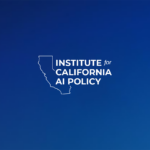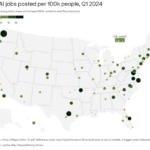The Future Workforce in the World of Al

The explosion of data in recent years has raised a number of ethical issues, from personal privacy to the integrity of our information architecture. The continued advancements in machine learning (and eventually artificial intelligence), fueled by this wealth of data, raises even more issues. Chief among them is the threat to jobs. As the CEO of a company that employs 5,000 people, and makes software that applies machine learning to enormous data sets, this topic, and its potential ethical and societal implications, is definitely top of mind.
While many experts, including the World Economic Forum, predict that Al will create more jobs than it displaces, there are millions of workers today whose current skills are in danger of obsolescence, but are not yet on a path to acquiring the new skills they’ll need.
It makes ethical and business sense to try to mitigate the impact of Al on the workforce. Obviously, strong employment fosters a better society. And for the business bottom line, a skilled workforce will allow companies to take full advantage of the possibilities of this evolving digital era. That means providing everyone the opportunity to evolve into new roles – the creation of not merely a digital economy, but an inclusion economy
Encourage data literacy
Individual workers must pursue the soft skills and the new technical acumen they’ll need to stay viable in a dynamic economy. Government and educators need to encourage digital literacy as well as technical training . The Trump Administration’s recently announced American Al Initiative recognizes this issue. Digital enterprises, as early adopters of Al and machine learning, are already thriving with an emphasis on digital literacy We need to apply these lessons to other communities so the right skills, and access to the right tools, create opportunities to succeed.
From a business perspective, we must take steps to help our workforce evolve. Cutting-edge skills are by nature rare, and most businesses are already fighting a “talent war” for qualified workers in engineering and data science.
Encouraging talent growth from within can be faster and less expensive than hiring externally, and it preserves your culture.
At Splunk, we use education reimbursement, training opportunities in technical and soft leadership skills, and online learning portals such as LinkedIn Learning We also encourage everyone to set career goals and to carve out work time to pursue them.
People and machines working together will produce meaningful outcomes
While there are quite a few hurdles to overcome as artificial intelligence and machine learning spring into mainstream usage, one constant will be our human drive toward curiosity and progress. With a commitment to moving forward together, we’ll move society in a meaningful way, uncovering insights to questions we didn’t know how to ask.
Leading Splunk, I’m very conscious of the need to build a culture of curiosity, learning and inclusion. It’s a necessary part of my role as a steward of the company, and it’s an ethical way to approach the fast-moving era of data and artificial intelligence.
October 4, 2019



